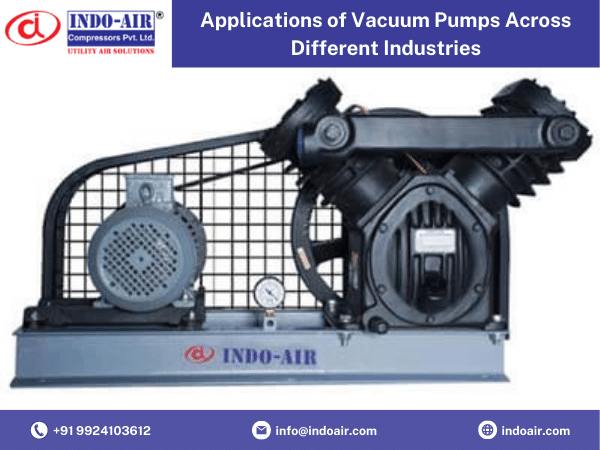A vacuum pump is a piece of machinery that may force gas or air molecules out of a sealed chamber to create a partial or low-pressure vacuum. A vacuum is a condition when the pressure inside the chamber is lower than the pressure outside the chamber or in nearby systems. This is different from an absolute vacuum, when there are no gas molecules and a pressure of 0 Pa. Different types of vacuum pumps are manufactured by vacuum pump manufacturers in Ahmedabad and the purpose of all pumps is to convert energy into pressure. The amount of power required to operate a pump varies with air pressure. A vacuum pump works more effectively the greater the atmospheric pressure. As atmospheric pressure affects vacuum pump performance so significantly, it also affects vacuum pump operating costs and varies with temperature, humidity, and altitude.
Applications of Vacuum Pumps in Different Industries
There are a lot of industries where vacuum pumps are applied and utilised efficiently. These are
- Ceramics: Vacuum pumps are used in the deaeration process of ceramic materials in extruders in the ceramic industry. This is a method of removing air to produce a product of superior quality. To achieve process efficiency, simultaneous mixing and vacuum deaeration may occasionally be used. Vacuum pumps considerably shorten the time required for deaeration.
- Fabrication of metals: Since vacuum pumps can withstand the entry of polluted gases, which may cause corrosion, they are crucial in the heavy fabrication sectors. Controlling surface reactions is essential for producing the desired output while treating metal. In addition to eliminating these surface impurities, vacuum pumps may also be used to degas and change the oxides that are present on a material’s surface. These techniques include brazing, hardening, annealing, case hardening, sintering, tempering, and diffusion bonding. The pumps are commonly used in these processes.
- Mining, oil and gas industries: For recovering carbon dioxide in flue gas compressors at a maximum temperature of 1000 fahrenheit, vacuum pumps are particularly helpful. They are employed in the filling and cleaning of petroleum barrels using vacuum pumps. They are used for vacuum filtering during the dewaxing process, recovering petroleum vapour from storage tanks, and vacuum priming of pumps. The vacuum filtration of mining products including alum, coal fines, copper, feldspar, fluorspar, gold, iron ore, lead, uranium, vanadium, and zinc makes use of pumps.
- Manufacturing of plastics: The method of heating plastic sheets and spreading it over a mould is known as vacuum moulding. The sheet is drawn into the mould by a vacuum that is produced. The finished item is then removed from the mould. As vacuum pumps are used in this process, minimal forming pressures may be necessary, increasing process efficiency. The pumps are utilised in plastic mixers and extruders for vacuum deaeration.
- Medical Industries: Vacuum Pump is a major component of steam sterilisers that is useful for cooling and drying surgical equipment in the medical field. For the purpose of removing ethylene chloride during the sterilising process, they are also utilised in sterilisers. Since medical industry is a sensitive one, vacuum pumps are used with utmost care
- Vacuum Pump Varieties Using Positive Displacement: Positive displacement pumps regularly increase a cavity’s volume by expanding it. Following a portion of the chamber being sealed off and drained, gas or fluids are pumped to the desired locations. This is constantly done. The most typical pumps are rotary vane pumps. The design of diaphragm pumps prevents oil pollution, and they are also widely used. The resistance of liquid ring pumps to dust is quite high. Pumps with pistons and blowers are also rather typical.

